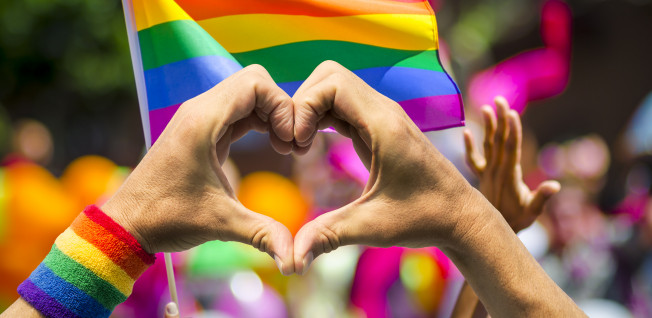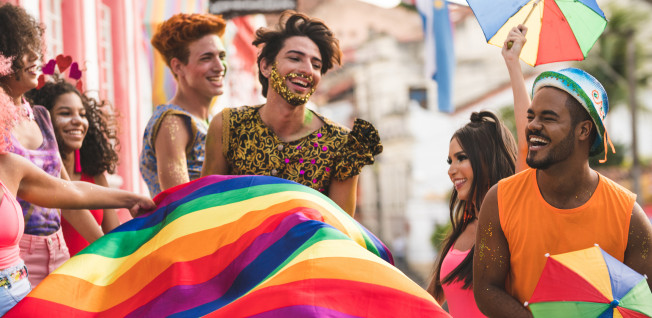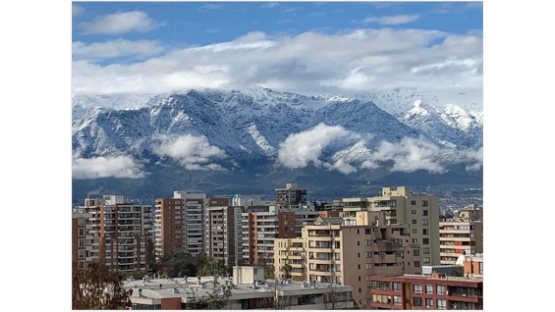The Highs & Lows of Being an LGBTQ+ Expat
Every June, the world celebrates Pride Month with rainbow flags and lavish parades. But while members of the LGBTQ+ (lesbian, gay, bisexual, transgender, queer*, etc.) community can openly share their identity in some countries and cities around the world, other destinations are not as welcoming.
Before they embark on their adventure, it can be helpful for LGBTQ+ expats to know what to expect when living abroad. Here’s what our followers on Instagram shared about their experiences living abroad while being queer.

Things Are Getting Better in Brazil
Brazil is a country of ups and downs for members of the LGBTQ+ community. Due to its size and varied regions, there are many areas that are very friendly towards queer people. This is especially the case in big cities.
“I live in São Paulo, which is a rather open city regarding the LGBTQIAP+ community. We have the biggest Pride Parade in the world,” one of our Ambassadors there shared with us. “But some parts of the city are not safe.”
Still, queer expats can find their niche in Brazil. Civil unions between same-sex couples have been recognized there since 2011, and same-sex marriage became legal in 2013. São Paulo, Rio de Janeiro, and Brasilia have thriving LGBTQ+ communities and organizations that advocate for equality.
Our Ambassador pays attention to what’s going on in his InterNations Community to make sure everyone who attends the events feels safe and welcome. “Although here in São Paulo things are getting better, as an InterNations Ambassador, I always keep an eye out for our LGBTQIAP+ members, in case there are any negative comments or attitudes of non-acceptance.”
Despite several legal advancements, Brazil has one of the highest rates of transgender murders in the world. And even those who identify with the gender that was assigned to them at birth often face discrimination and violence. “I believe one thing worth mentioning is that still today, there are a lot of places where we worry about our safety, our survival, and sometimes we are scared of physical violence.”
His past expat experience, outside his home country of Brazil, was very eye opening. “While I lived in New York, I saw that there was a great sense of community among LGBTQIAP+ people. I went to a panel at New York Comic Con about the queer community, and I learned a lot, so I started going to workshop classes, and the community was really nice.”
In the end, his time in New York also inspired how he now runs the InterNations São Paulo Community. “Being a foreigner myself, it felt really nice when people started inviting me to discover new places in New York. For me it was the first time that I had this feeling of community — of feeling welcome, safe, and to help and be helped.”
Bigger Struggles in Tunisia
Unlike LGBTQ+ expats in Brazil who can find their community in bigger cities, those in Tunisia often face an uphill battle. Despite it being more progressive than other countries in the region in some ways, homosexuality is still illegal in Tunisia. “Life in Tunisia for LGBTQ+ people is really difficult and scary, simply because there’s no law that protects us from any harm or homophobic attacks. We don’t have any real safe LGBTQ+ places (bars, restaurants...) so we always have to be careful and not really be ourselves.”
Without a community of other queer people and the fear of violence and persecution, many expats return to the closet when they move to Tunisia. “You have to make a choice or live in a lie just because you are scared to lose your friends, family, job, etc. You also need to be careful on dating apps — who knows, you might be having a conversation with a fake profile … life in Tunisia as an LGBTQ+ person is stressful and scary.”
Fortunately, organizations like Mawjoudin (an officially registered NGO) are fighting for the rights of the queer community in Tunisia.

Everything’s Sunny in Spain
Spain is a trailblazer. The country legalized same-sex relationships in 1979 and was also one of the first to legalize same-sex marriage in 2005. Especially larger cities offer a great environment for queer expats, with their vibrant communities and large-scale Pride events.
Although attitudes in smaller towns may be slightly more conservative, one of our members feels right at home in Spain. “We immediately noticed that the people living in Spain are more tolerant of the LGBTQ community. There are, of course, exceptions, but in general it’s super. This is one of the reasons that we now live in Spain.”
Their life in Spain offers more freedom and happiness than what they experienced before while living in the Netherlands. “I moved to Rotterdam because it was more lively, cozy, and open minded there. In 2010, I met the love of my life, and we had fantastic years in this great city. Unfortunately, we also saw the city change, not just towards the LGBTQ community, but in general and not in a positive way.”
The Netherlands is generally a rather safe country for LGBTQ+ expats as well. But this member appreciates the fact that in Spain, they don’t have to explain themselves. “They just treat you like people, like a full-fledged couple. If you’re nice, they’ll be nice back, and that’s just the way it should be.” And even though their city doesn’t really offer any specific establishments for LGBTQ+ expats, they feel right at home there. “There are no gay bars in the city where we live, but that is not necessary, because everywhere you can be yourself.”

More LGBTQ+ Experiences
In addition to the three stories above, many members shared their experience of living abroad as a queer expat. Some did not specify any destinations:
“After I moved abroad, it was finally legal to say I'm a part of the LGBTQ+ community — 10 out of 10 experience.”
“I cannot imagine living in a country which forbids me to love whom I want to love.”
Others were more specific, putting things into perspective …
“Being gay in Midtown Manhattan is not the same as being gay on Brighton Beach or in Harlem.”
… praising their country …
“Ljubljana, the capital city of Slovenia, can be considered one of the most friendly cities for LGBTQ people.”
“My country of birth Ireland is very welcoming, I believe, also from a legal point of view.”
… or being honest about the current situation:
“The country where I live (Netherlands) is definitely more open than the one I come from (Italy). In any case, I believe that there is still much to do for the LGBTQ+ community.”
“In my country of origin, Croatia, the situation is not as good as where I live now, Germany. Germans on average do not care what someone is doing and with whom.”
“I live in Italy and all I can say is: it depends. I mean, young people are definitely welcoming, but our government is really homophobic unfortunately.”
Resources for LGBTQ+ Expats
A move abroad gives you a lot of things to consider. Beyond the usual aspects (cost of living, the local culture, the housing market, etc.), LGBTQ+ expats also need to keep their safety in mind. Not every country offers a friendly environment or equal rights to members of the queer community.
Before you make a move, research the local culture and legislation thoroughly. These are some resources to give you an idea of the legal situation around the world:
- Equaldex has information on the progress of LGBTQ+ rights worldwide
- Human Rights Watch has a list of countries with anti-LGBTQ+ laws …
- … as well as an overview of countries that have legalized same-sex marriage and civil unions
Keep in mind that the situation can vary from region to region. Even some countries which appear open to the queer community might have so-called no-go areas or are in the process of introducing anti-LGBTQ+ laws.
Stay safe and find your community!
*The word “queer” used to be a slur which described members of the LGBTQ+ community. However, the community has reclaimed the word, and it can serve as an umbrella term for members of the LGBTQ+ community, including those who choose not to label their sexual orientation or gender. This is how we use the term “queer” throughout this article.











